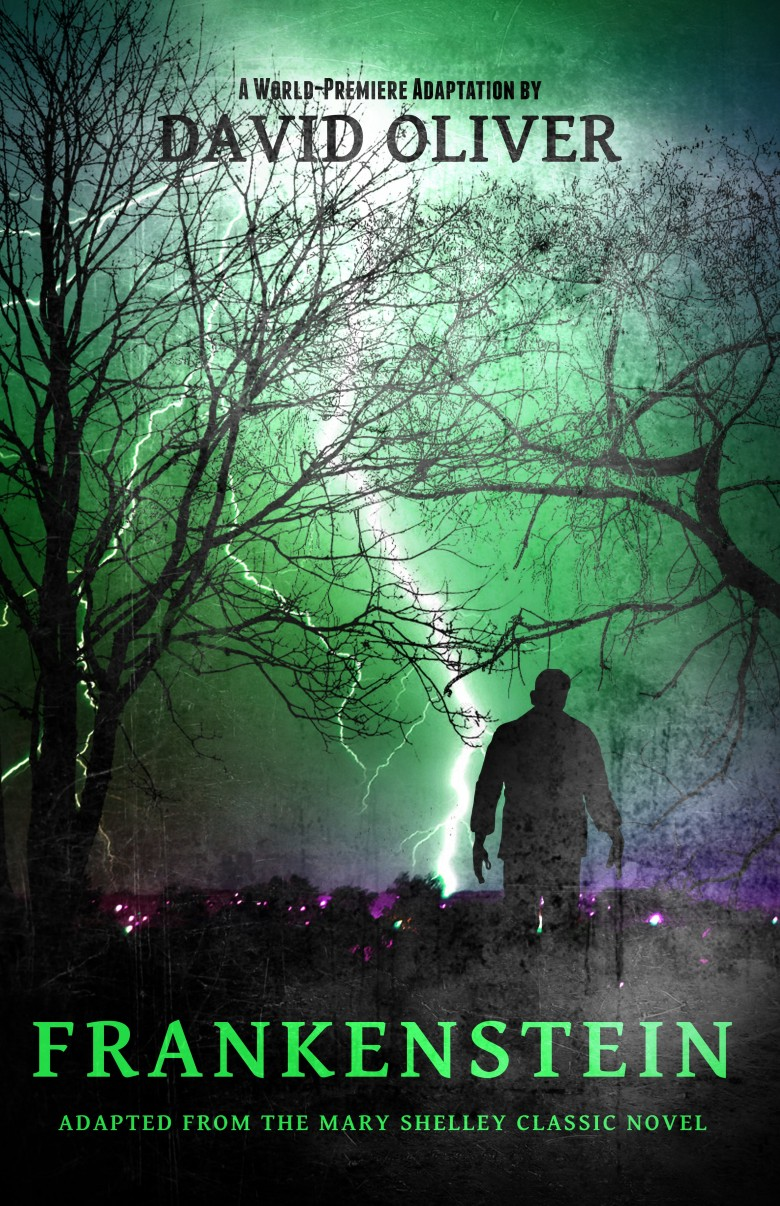When humans presume the role of God, monsters are created. But which is the monster – the creator or the created? How far can humans go in disrupting the natural order before destroying themselves and what they’re attempting to create? Just because something can be done, does that mean it should be done? And if it’s done and it’s destructive, can we recover from it without further destruction?
Road Less Traveled’s “Frankenstein” grapples with these questions in a very strong production adapted and directed by David Oliver. This is the world-premier of this adaptation of Mary Shelley’s 1818 novel. The play is well written in that the above questions are addressed without it being pedantic. We are shown the results of hubris and obsession, rather than being told about them. The play is full of action and movement that create feelings of fear, compassion, and horror in the audience. This play is not for the faint of heart, and definitely not for children.
For those of you who never read the book or saw any of the movies, “Frankenstein” tells the story of a young scientist who has the bright idea of creating a powerful being from used body parts. This creation will be able to do the labor of many, and so free up humans to pursue more pleasurable things in life rather than spending 14-hour days in factories and mines. In other words, Victor Frankenstein decides to play God.
Victor successfully re-animates his cobbled-together creation, but like so many things in life, it doesn’t turn out the way he planned. He rejects the Creation, abandons it, and it is left to fend for itself in a very hostile world. It eventually enters a forest and is befriended by a Communist woodsman (the setting was changed by Oliver from 1800 to 1900). Through the friendship of the woodsman, the Creation learns to speak and develops the ability to love and feel compassion. What, then, is he to do with these all too human feelings and needs when he’s the only one of his kind in the world? The remainder of the play is a response to this question.
Steve Copps is superb as the Creation. He transforms from a beast-like, lurching, hulking, terrified creature into a feeling being over the course of the play. He knows what he is, is heartbroken, and conveys this in his movement, facial expressions, and voice. The depth of his feeling is palpable, as are his subsequent rage and desire for revenge.
Jonas Barranca as Victor Frankenstein is the obsessed, overwrought scientist who despises and abandons his creation, to his lasting anguish and sorrow. He is tormented by what he has done in creating a “monster,” but shows no compassion for his creation. Like Icarus, who flew too close to the sun, he has no choice but to fall to earth. And he lands very hard. Mr. Barranca plays this well if occasionally with a bit too much angst, and if he’s slightly wooden in his moments with the fair Elizabeth, isn’t this how a scientist might be when he’s out of his laboratory?
John Profeta is playful and compassionate as Komarovski, the Communist woodsman. He is a delight to watch. His humor and love of life is counterpoint to the angry-young-man of Adam Yellen as the other Communist woodsman. Mr. Yellen’s dogmatism and fear – and don’t they always go hand-in-hand? – are the catalysts for the Creation’s final abandonment. The women in the play are stereotypical, long-suffering fiancé, wife, mother, servant. Candice Kogut (fiancé, wife) as Elizabeth brings a gentle loveliness but no real heat to her role. Marisa Caruso (wife, mother, servant) does a very good job as the dogmatic woodsman’s wife. She has a few humorous moments, along with Komarovski, in an otherwise very dark play. Gerry Maher as Victor’s father and Joel Fesmire as the child, William, round out a very good cast.
The set design by Dyan Burlingame and use of a large rectangular structure that acts as the electric machine that re-animates the Creature, a woodland hut, and Victor’s rural laboratory are very effective. Victor’s childhood home, all soft lighting, is on a platform upstage, as if it were remote not only from the audience, but from Victor himself. Lighting by John Rickus, music by Eric Burlingame and sound by Katie Menke are all in synch, creating fear, storms and a feeling of massive dark machines and industrial filth, a sense of terror, and a frozen barren world, as well as moments of compassion and love.
This is not an easy play to watch, but it does an excellent job of dramatizing the results of extreme narcissism, a lesson we can all pay attention to in this political climate. Gods and humans. Fathers and sons. What do we owe each other? And what happens when we fail each other? Victor Frankenstein opened his Pandora’s box, and truly, all that was left inside was Hope.
Performances of this World Premiere Adaptation by David Oliver are on Thursdays - Saturdays at 7:30pm and Sundays at 2:00pm through February 12, 2017 at the Road Less Traveled Theatre.
Frankenstein
Sat Jan 21st → Sun Feb 12th
Days: Sun, Thu, Fri, Sat

